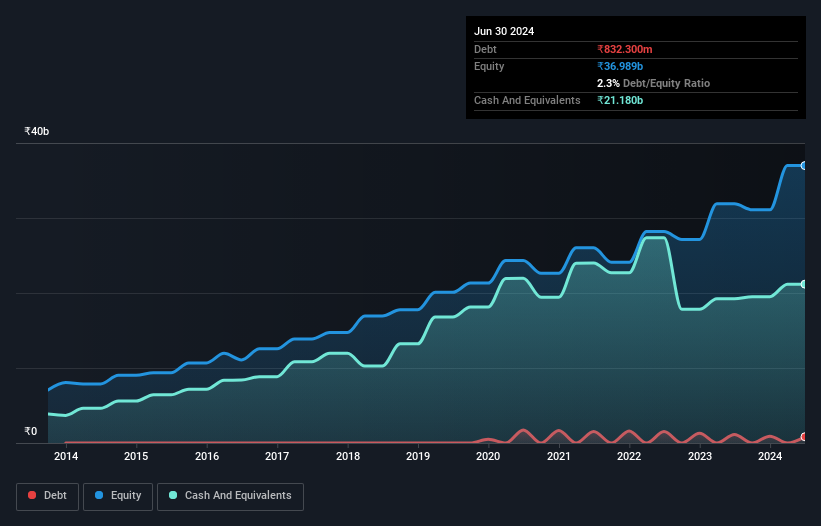
Legendary fund manager Li Lu (who Charlie Munger backed) once said, 'The biggest investment risk is not the volatility of prices, but whether you will suffer a permanent loss of capital.' So it might be obvious that you need to consider debt, when you think about how risky any given stock is, because too much debt can sink a company. As with many other companies Abbott India Limited (NSE:ABBOTINDIA) makes use of debt. But should shareholders be worried about its use of debt?
When Is Debt Dangerous?
Generally speaking, debt only becomes a real problem when a company can't easily pay it off, either by raising capital or with its own cash flow. If things get really bad, the lenders can take control of the business. While that is not too common, we often do see indebted companies permanently diluting shareholders because lenders force them to raise capital at a distressed price. Of course, debt can be an important tool in businesses, particularly capital heavy businesses. The first thing to do when considering how much debt a business uses is to look at its cash and debt together.
View our latest analysis for Abbott India
What Is Abbott India's Net Debt?
The image below, which you can click on for greater detail, shows that Abbott India had debt of ₹832.3m at the end of March 2024, a reduction from ₹1.13b over a year. However, it does have ₹21.2b in cash offsetting this, leading to net cash of ₹20.3b.

A Look At Abbott India's Liabilities
Zooming in on the latest balance sheet data, we can see that Abbott India had liabilities of ₹13.4b due within 12 months and liabilities of ₹1.52b due beyond that. On the other hand, it had cash of ₹21.2b and ₹4.44b worth of receivables due within a year. So it can boast ₹10.7b more liquid assets than total liabilities.
This state of affairs indicates that Abbott India's balance sheet looks quite solid, as its total liabilities are just about equal to its liquid assets. So it's very unlikely that the ₹641.2b company is short on cash, but still worth keeping an eye on the balance sheet. Succinctly put, Abbott India boasts net cash, so it's fair to say it does not have a heavy debt load!
And we also note warmly that Abbott India grew its EBIT by 15% last year, making its debt load easier to handle. When analysing debt levels, the balance sheet is the obvious place to start. But it is future earnings, more than anything, that will determine Abbott India's ability to maintain a healthy balance sheet going forward. So if you want to see what the professionals think, you might find this free report on analyst profit forecasts to be interesting.
Finally, a company can only pay off debt with cold hard cash, not accounting profits. While Abbott India has net cash on its balance sheet, it's still worth taking a look at its ability to convert earnings before interest and tax (EBIT) to free cash flow, to help us understand how quickly it is building (or eroding) that cash balance. During the last three years, Abbott India generated free cash flow amounting to a very robust 83% of its EBIT, more than we'd expect. That puts it in a very strong position to pay down debt.
Summing Up
While we empathize with investors who find debt concerning, you should keep in mind that Abbott India has net cash of ₹20.3b, as well as more liquid assets than liabilities. And it impressed us with free cash flow of ₹12b, being 83% of its EBIT. So we don't think Abbott India's use of debt is risky. Over time, share prices tend to follow earnings per share, so if you're interested in Abbott India, you may well want to click here to check an interactive graph of its earnings per share history.
If you're interested in investing in businesses that can grow profits without the burden of debt, then check out this free list of growing businesses that have net cash on the balance sheet.
New: Manage All Your Stock Portfolios in One Place
We've created the ultimate portfolio companion for stock investors, and it's free.
• Connect an unlimited number of Portfolios and see your total in one currency
• Be alerted to new Warning Signs or Risks via email or mobile
• Track the Fair Value of your stocks
Have feedback on this article? Concerned about the content? Get in touch with us directly. Alternatively, email editorial-team (at) simplywallst.com.
This article by Simply Wall St is general in nature. We provide commentary based on historical data and analyst forecasts only using an unbiased methodology and our articles are not intended to be financial advice. It does not constitute a recommendation to buy or sell any stock, and does not take account of your objectives, or your financial situation. We aim to bring you long-term focused analysis driven by fundamental data. Note that our analysis may not factor in the latest price-sensitive company announcements or qualitative material. Simply Wall St has no position in any stocks mentioned.
About NSEI:ABBOTINDIA
Flawless balance sheet established dividend payer.
Similar Companies
Market Insights
Community Narratives




